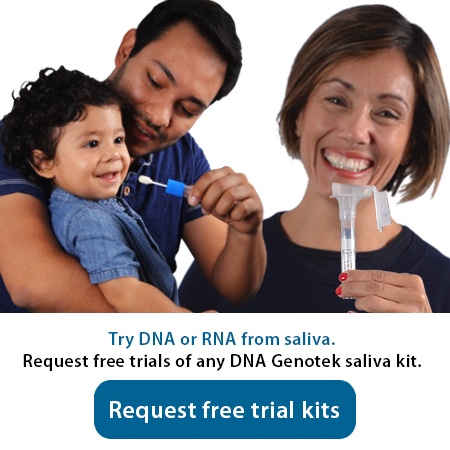2015-02-25
In the summer of 2011 we wrote about an exciting project out of the United Kingdom that selected Oragene collection kits for a study that aimed to unlock genetic changes behind development disorders. The Deciphering Developmental Disorders (DDD) study is a direct collaboration with all twenty-three of the NHS Clinical Genetics Services from across the UK together with the Wellcome Trust Sanger Institute.
Since that time, the scientists and researchers behind DDD have recruited more than 8000 family trios with children who have a serious delay in their physical or mental development. DNA samples were collected from the children and their parents with the Oragene/saliva collection kits. Study participants were mailed the Oragene kit to provide a small saliva sample that was returned via the mail.
In a recent publication in The Lancet, the researchers highlighted some early results from the study, which performed genome-wide microarray and whole exome sequencing on the UK-wide cohort. Analyzing genetic variants in 1,133 children with severe undiagnosed developmental disorders and their parents using a combination of exome sequencing and array-CGH data, the researchers identified 12 novel genes associated with their disease, increasing the diagnostic yield from 28-31 percent.
According to the publication[1]:
Saliva samples from patients and their parents were collected (Oragene collection kits, DNA Genotek, Kanata, ON, Canada) and DNA extracted (QIAsymphony, Qiagen, Venlo, Netherlands); blood-derived DNA from the child was also provided by the regional genetics laboratories. DNA samples from patients and their parents were analysed at the Wellcome Trust Sanger Institute with microarray analysis (Agilent 2x1M array CGH [Santa Clara, CA, USA] and Illumina 800K SNP genotyping [San Diego, CA, USA]) to identify copy number variants (CNVs) in the child, and exome sequencing (Agilent SureSelect 55MB Exome Plus with Illumina HiSeq) to investigate single nucleotide variants (SNVs), small insertion-deletions (indels), and CNVs in coding regions of the genome. Putative de novo sequence variants identified using DeNovoGear were validated with targeted Sanger sequencing. The DNA samples will be analyzed using powerful, high-resolution chip technology and next generation sequencing.
The study demonstrates the power of using a genotype-driven approach to identify subsets of patients with similar disorders. These newly implicated genes increase by 10% (from 28% to 31%) the proportion of children that could be diagnosed.
In a recent GenomeWeb[2] article, the authors commented that the results "validate a large-scale genotype-driven strategy for novel developmental disorder-linked gene discovery that is complementary to the traditional phenotype-driven strategy of studying patients with very similar presentations, and is particularly effective for discovering novel developmental disorders with highly variable or indistinct clinical presentations."
The early success of this research team highlights how Oragene can be used to collect saliva-based DNA samples from research participants by mail, the non-invasive collection method is ideal for both children and adults, and its high quality and high quantity DNA is proven on the most demanding downstream technologies including array-CGH and exome sequencing.
Are you thinking of trying Oragene for yourself? Click here to request samples for evaluation purposes.


